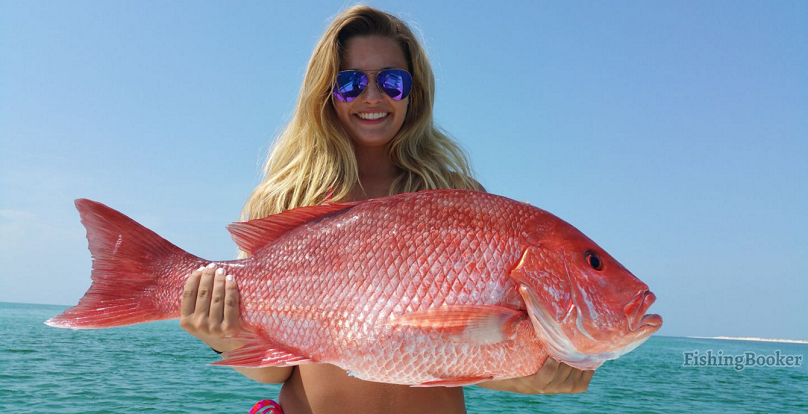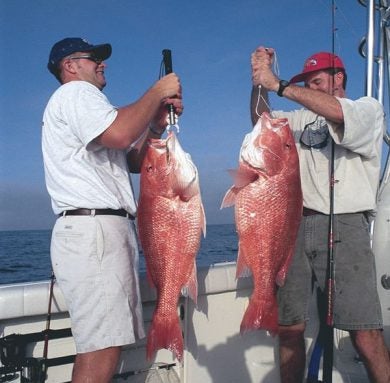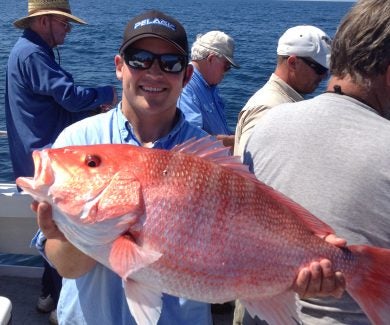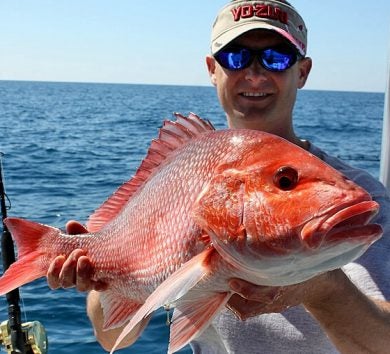Red Snapper Angler Anger Directed at Obama, but Trump Could Solve Fishing Frustrations
Bob McNally 05.25.17

President Donald Trump has stressed the need to make states the “laboratories of democracy.” He calls for fewer burdensome federal regulations, and declares that it’s past time to “drain the swamp.”
All of that could be quickly coming to a head in the Gulf coastal states where he secured some of his highest vote totals during last year’s election. State and local leaders are boiling mad over what they say are excessive federal regulations when it comes to fishing in the Gulf of Mexico.
Specifically, the frustration is directed at an all-time shortened season (three days) for recreational red snapper fishing within federal waters.

Anglers are asking for an immediate lengthening of the recreational season to 46 days, spread over a series of three-day weekends.
If nothing happens between now and the first of June, anglers are poised to protest on June 4, the day after this year’s three-day season expires.
The entire matter could perhaps be resolved by one man: Trump.
U.S. Rep. Bradley Byrne, R-Ala., said he believes the president would be “sympathetic” to the concerns raised among recreational anglers and their GOP political supporters in Alabama, Florida, Mississippi, Louisiana and Texas. But getting the issue before the White House, especially at a time of hectic activity, might prove difficult.
“There are a lot of big things circling at the White House right now,” Byrne said.
Byrne’s hope is that Ross will press forward with appointing permanent heads of the National Oceanic Atmospheric Administration and the National Marine Fisheries Service. NOAA, through the Fisheries Service, regulates the nation’s federal waters and is the entity responsible for establishing the limited recreational fishing dates and quotas.
“We have no newly appointed head of NOAA or at the National Marine Fisheries Service,” said Byrne, who has advocated for cutting the Fisheries Service’s funding. “You have career staff people there and they won’t be doing anything but preserving the status quo.”
But, Byrne added, “a very specific and direct executive order could change this.”
Much of the blame has been directed at former President Barack Obama’s Democratic administration. During Obama’s tenure, red snapper season had been in a freefall, culminating in this year’s three-day season.
Gulf anglers believe that Trump’s administration will chart a new and better course. Said Blakely Ellis, head of the Alabama chapter of the Coastal Conservation Association: “Compared to the previous administration, there is definitely a shining light. Before we didn’t have much hope of having change.”
Anglers insist the snapper population is healthy and growing, and that research supports the point.
According to a written testimony this month from Earl Comstock, director of the Office of Policy and Strategic Planning with the U.S. Department of Commerce: “As the population rebuilds, fish are getting larger and the average weigh at harvest is more than twice as much before.”
But Comstock noted that the rebuilding plan, while ahead of schedule, is not yet complete. The key, he said, is to ensure “rebuilding benefits in the fishery are fairly and equitably distributed among all user groups.”
But herein lies the challenge: As the fish get bigger and more abundant, federal quotas for recreational fishing are being reached more quickly.
Meanwhile, there’s a wide discrepancy in the number of allowable fishing days for recreational anglers and those for commercial interests. At present, for example, charter boats can fish for 49 days.
Federal law, through the Magnuson-Stevens Act, sets the annual quota based on a level specified by scientific advisers who report their findings to the Gulf of Mexico Fishery Management Council (otherwise known as the “Gulf Council”).
Many fishermen accuse NOAA of backing “bad science” in determining the quota.
Chris Blankenship, deputy conservation commissioner with the Alabama Department of Conservation and Natural Resources, said that he believes NOAA is basing its determinations on data that is “three to four years behind” what anglers are actually witnessing in the waters.
Advocates for a lengthened recreational season are hopeful that the new Trump administration allows states more authority in regulating the season. “We certainly have a lot of confidence of our state’s fishery managers at the Department of Conservation and Natural Resources,” Blankenship said.
The Alabama has set its annual recreational season at 67 days, from May 26 to July 31. The season is for recreational fishing within state waters that extend 9 nautical miles from shore.
Blankenship said he believes more state authority in regulating Gulf waters would be fair for Alabama, which has more than 1,000 square miles of artificial reefs inhabited by red snapper.
Alabama just recently was able to extend its state boundaries from 3 to 9 nautical miles off the shoreline through federal action. Previously, only Texas and Florida were granted a state boundary of 9 nautical miles.
“We catch 40 percent of (the United States’) red snapper off our tiny coastline,” said Blankenship. “It’s very unfair to us in comparison to other states.”
Blankenship advocates for a recreational season within the Gulf waters at “two to three months,” and congressional action to “do away with the hard quota” system in place for red snapper.”That would be helpful and it would help us get out of this spiral we are in,” Blankenship said.
Absent that, Blankenship said a federal judge could order a longer recreational season, or Trump could unilaterally flex his presidential muscle. “There are a few methods that could be used,” said Blankenship. “The president issuing an executive order is one.”

